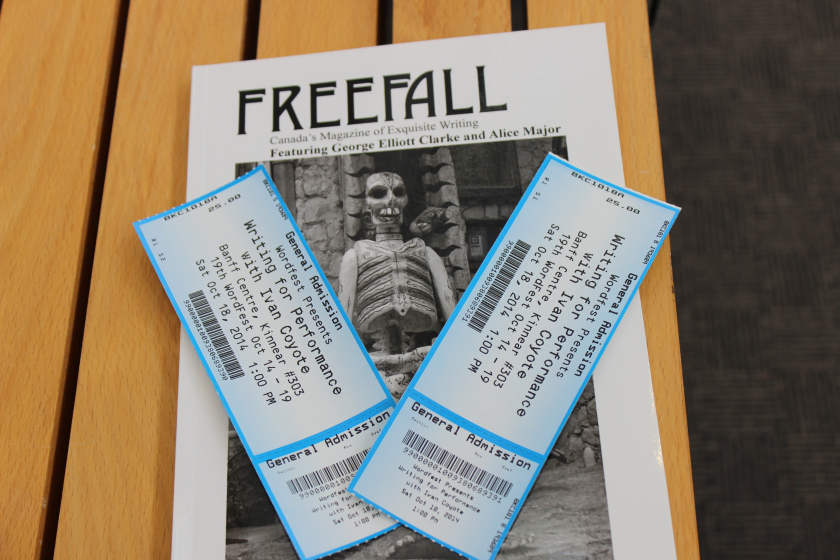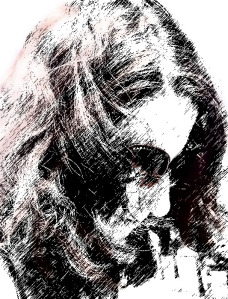 What I learned about performing from Ivan Coyote:
What I learned about performing from Ivan Coyote:
Ryan and I attended the Wordfest Workshop: “Writing for Performance with Ivan Coyote” back in October 2014. Ivan is one of Ryan’s favourite performing artists, so as soon as we realized that Thomas King and Ivan Coyote would be in Banff Friday night and Saturday afternoon respectively, there was no discussion as to what we would be doing that weekend.
Full disclosure: I’m a social klutz. The thought of speaking in front of a crowd doesn’t actually scare me like it once did, but I bumble like I’m twelve years old none-the-less. I remember being terrified when I had to participate in a mock parliamentary debate in high school. I nailed my argument in a way no one else had but I shook the whole time. It’s frustrating to be so confident and still trip over my own tongue, or worse, to have my systematic mind start circling mid-sentence (think of standing in a circle of people at a party, arguing with yourself under your breath, when mid-argument you get very very loud). Being painfully aware of all this I thought “writing for performing” is just what I need. I envy those who get up and share their work, but, “ack,” no way am I doing THAT!
Ivan was fantastic – confident and honest. Ivan had tips I never would have thought of and yet they were practical and simple. The kinds of things I can’t believe I didn’t think of. This is what I learned from Ivan Coyote (this is not an exhausted list of everything Ivan taught that day. Ivan worked hard at this workshop and I feel it would be unfair, without permission, to share it all for free. Most of what’s written here are my thoughts that came out of Ivan’s lessons):
- The stage is an exchange – powerful and vulnerable at the same time:
What’s that old saying? You get back what you put in.
- Why do you remember the performances you remember:
Energy is probably one of the number one aspects that creates a memorable performance for me, that and audience engagement. Not stand-up comic style engagement, but the subtle body movement a dancer directs towards the crowd. Most observers have no conscious idea it just happened and yet they are pulled into the performance just that little bit deeper. Great burlesque, Rufus Wainwright’s cover of “Chelsea Hotel,” or Ivan Coyote’s story telling voice do this.
- Always remember the tech’s name:
Did I not say there was some simply practical advice coming? As the daughter of a floor layer, I know to appreciate the work of the person behind the scenes (or under your feet), and still this was probably the best advice I got that day.
- Get to your performance early – fires that need to be extinguished won’t happen in 5 minutes. But with time, everything is fixable:
I have this weird, deep, psychological pull to never get too ahead of any task. I am the worst procrastinator. I know how bad leaving things to the last minute can be for the stress level of anyone and everyone and I do it all the time.
- Before a performance, take some time for yourself:
Don’t be that tornado that whirls in the door straight from work, downing a fruit smoothie, heart racing, and mind pounding because you are sure you’ve forgotten something in your other bag…oh no, you wanted to wear the red shoes and they’re in the car three blocks away.
- Eat two or three hours before your performance:
Nothing’s worse than debating what excuse will allow you an extra five minutes in the bathroom without suspicion. I can’t think of anything that creates indigestions faster than nerves and a full belly.
- Drink water all day:
You know that person who’s talking to you at work and all you can hear is the saliva in his mouth. The slapping, clicking, thick, slick sound? Don’t be “that guy.”
- Be kind to the staff. Be the example you want others to be:
P.S. that sound guy from earlier, he’s your co-worker not your subordinate.
- Prepare less time then asked. You’ll always go over your prepared time:
And if you’re as nervous as me, prepare half the time.
- Read the other readers, what did they do? Be ready to possibly change your idea:
Ivan spoke of a time they were part of a line of performers and realized the mood of what they had prepared was drastically different than the atmosphere the crowd was absorbed in, so they changed the performance to fit the mood of the show.
- Know and respect your equipment:
Need to loosen or tighten a boom stand? Righty tighty, lefty loosey. Even the technical stuff is simple if you just get there early enough to be relaxed to think about it for a second.
- Make performance copies that are easy for you to read without flipping pages all the time. A music stand is a great set up:
Going back to that be early and respectful of the staff. It’s very easy to get a music stand if people have the time to get one for you. Rushing in last minute and demanding a music stand because no way are you using that podium, may get you the crappiest music stand in the building. You’ll know there were better ones available when you hear the staff snickering every time the stand slides down on you causing you to stop, pull it back up, and righty tighty it into place.
Now I just need a workshop titled “print off your stories, put a stamp on an envelope, and mail out your work so you can be invited to make a public appearance in which you can use all you learned from Ivan Coyote.” But kidding aside, Ivan’s workshop was more impactful than I expected it to be. Ivan made what is simple, simple. And as cliché as it may sound, it emphasized the fact that the people I admire performing are artists like me. They also get nervous but they don’t let it stop them from sharing their art with others.
 Born and raised in Calgary, Crystal has been writing for over fifteen years. She studied creative writing in both fiction and poetry at Mount Royal University. She writes out of her childhood home where a postcard view of downtown and the Rocky Mountains often distracts her. Other welcomed distractions in her life are her daughter’s ever evolving views on humanity, listening to her talented partner Ryan read drafts of his own work, and wine. Crystal is most inspired in her own writing when exploring the Rocky Mountains or the banks of the Bow River.
Born and raised in Calgary, Crystal has been writing for over fifteen years. She studied creative writing in both fiction and poetry at Mount Royal University. She writes out of her childhood home where a postcard view of downtown and the Rocky Mountains often distracts her. Other welcomed distractions in her life are her daughter’s ever evolving views on humanity, listening to her talented partner Ryan read drafts of his own work, and wine. Crystal is most inspired in her own writing when exploring the Rocky Mountains or the banks of the Bow River.

